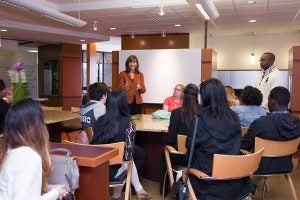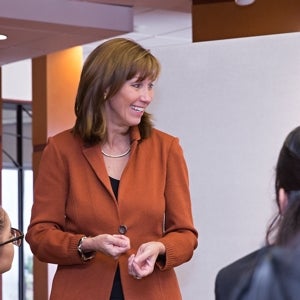 KINGSTON, R.I. — If a group of high school students recently visiting URI’s College of Nursing is any indication, the future of nursing is bright, motivated and diverse. Sophomores and juniors from a health occupations class at Woonsocket Area Career and Technical Center toured White Hall and spoke with Dean Barbara Wolfe and Assistant Clinical Professor Wylie Dassie.
KINGSTON, R.I. — If a group of high school students recently visiting URI’s College of Nursing is any indication, the future of nursing is bright, motivated and diverse. Sophomores and juniors from a health occupations class at Woonsocket Area Career and Technical Center toured White Hall and spoke with Dean Barbara Wolfe and Assistant Clinical Professor Wylie Dassie.
“I’m determined to become a nurse,” Ebony Valembrun said of her interest in URI’s program “My uncle was a nurse; I have a lot of family in the medical field, and I love people.”
Dean Wolfe told the students about her career and education — from floor nurse to advanced practice nurse specializing in psychiatric care, to researcher, college faculty member and administrator.
“There’s always a place for you; the sky’s the limit,” Wolfe said. “It’s a trusted profession and a privilege to be a nurse. You get to be at a person’s bedside at some of the most critical times in their life.”
Dassie spoke of his non-traditional career path. He became a nurse in the U.S. Army, gaining medical-surgical, trauma and psychiatric nursing experience. “If I had to go back, I would do it all over again,” he said.
The students toured the College’s simulation labs, which include interactive mannequins that exhibit symptoms, vital signs and bodily functions. “Simulation labs let you improve muscle memory,” Dassie later explained. “We can change the variables without risking a bad outcome.”
Students asked Dean Wolfe about courses, clinical opportunities and admission. She told them of the increasing competitiveness of the admission process but advised the teens that gaining entry is about more than grade point average. “We want nurses who aren’t just book smart but who have the qualities needed to provide compassionate care,” she said.
Elizabeth Guillen, associate director of the College’s Southern Rhode Island Area Health Education Center, arranged the visit with Woonsocket teacher Debra Bacon, an alumna of URI’s nursing program. The Center aims to develop high-quality health care professionals by recruiting and supporting students throughout their academic careers, particularly those from underserved populations.

